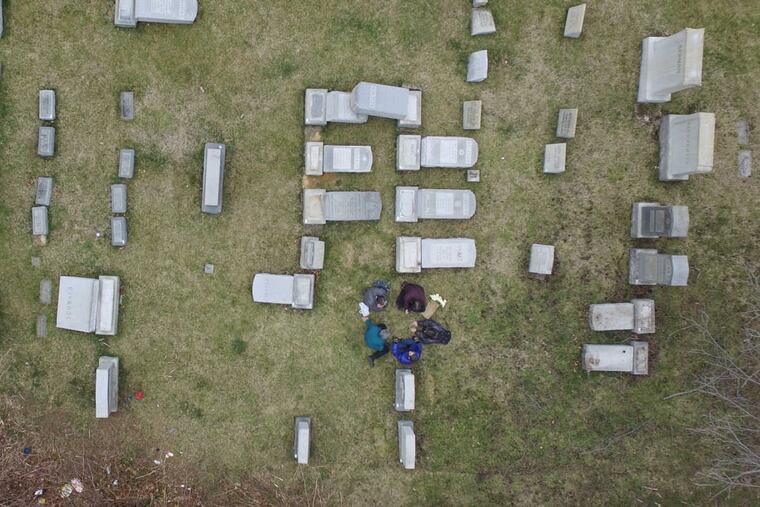Letters: Cemetery vandalism an indignity for us all
An indignity for us all For the people of Christ Church Philadelphia, the vandalism of Jewish gravestones at Mount Carmel Cemetery is deeply and painfully felt ("Headstones toppled at Jewish cemetery," Monday). Our Scriptures teach that when one member of the religious

An indignity for us all
For the people of Christ Church Philadelphia, the vandalism of Jewish gravestones at Mount Carmel Cemetery is deeply and painfully felt ("Headstones toppled at Jewish cemetery," Monday). Our Scriptures teach that when one member of the religious community suffers, we all suffer. This heinous and hateful act is to be condemned unequivocally as not only anti-Jewish, but as an affront to all people of faith in our beloved city, which has been a beacon of religious diversity and toleration for centuries.
Since 1746, Christ Church has stood side by side with Philly's first synagogue, Congregation Mikveh Israel. Several years ago, historians discovered that David Franks, a Jewish patriot from the Revolutionary era who died in the yellow fever epidemic, was buried in the Christ Church Burial Ground in 1793, not far from the grave of Benjamin Franklin and other signers of the Declaration and Constitution. He never had a gravestone. In a moving moment of interfaith generosity, Rabbi Albert Gabbai consecrated the Christ Church ground for Jewish burial, and we marked, finally, the grave of Major Franks. Since that moment, we have considered the Christ Church Burial Ground not as Christian ground, but hallowed ground, as surely as the ground of Mount Carmel is hallowed.
All the hallowed ground of our city has been desecrated by this terrible deed.
|The Rev. Timothy Safford, rector, Christ Church Philadelphia, tsafford@christchurchphila.org
Speak up against prejudice
Are the foundations of our democracy so fragile that they can be toppled as easily as gravestones in a Jewish cemetery? If we don't raise our voices in the face of intolerance, the violence will increase, and our country will be diminished. Our president should be speaking out loud and clear, yet he's strangely silent.
The Rev. Dr. Martin Luther King Jr. said: "The arc of the moral universe is long, but it bends toward justice." I'd like to believe that's true.
|Natalie Zellat Dyen, Huntingdon Valley
Trump's good move
On the rare occasions that our president does something right, he should be applauded.
An informal meeting had been planned in New York for U.S. and North Korean officials to discuss hot-button issues facing the two countries. This would ordinarily be a reasonable thing to do, but not today, and the administration has wisely canceled the meeting.
The first provocation was North Korean dictator Kim Jong Un's recently testing of a nuclear device, which could threaten the United States. That was followed by the murder of his half brother through the use of a banned nerve agent, a contemptible and outrageous act that bears every earmark of the ruthless young potentate, whose hatred and paranoia have resulted in the killings of those he sees as a threat or as disloyal.
One of the greatest problems the nation faces is the nuclear menace of North Korea, a growing stockpile of lethal weapons in the hands of a deluded and dangerous man who, along with his late father and grandfather, has made the United States look foolish as they have reneged on agreements executed between the two countries. Kim's behavior must not be rewarded.
|Oren M. Spiegler, Upper St. Clair, Pa.
Meet voters in person
Last week's town hall teleconference conducted by U.S. Rep. Brian Fitzpatrick (R., Pa.) was a good start in opening a dialogue with his constituents in Bucks County. But to allow for real public discourse on the people's concerns, he will need to open his doors to an in-person meeting.
I know of several callers wishing to discuss topics such as Obamacare and immigration who never made it through the screening process. While the dominant issue of opioid abuse is clearly a growing problem in our communities (and one which Fitzpatrick was clearly prepared to speak to), the number of calls taken on that subject did not fairly represent the range of issues on the minds of voters.
In his early days in office, Fitzpatrick has taken some encouraging positions on important issues, including his opposition to the White House travel ban. Facing voters in person will serve to grow their understanding of his views. And it will permit him to listen to their priorities. This direct communication is essential to making the right decisions for our country.
|Jeanne O'Shea, Bedminster, jeanneos@verizon.net